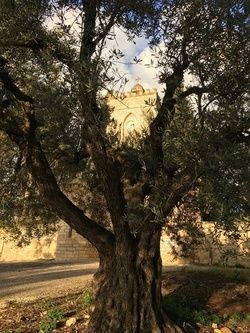Program Pillars

Why choose to join a Tantur program?
Almost since the founding of the Tantur Ecumenical Institute, we have offered open enrollment programs that bring scholars, clergy, religious and laity together in an educational experience based on the principles of ecumenism, interfaith, and community. For nearly fifty years, the roots of these programs have been based on providing participants with encounters, excursions, and lectures, all while enjoying their stay on our beautiful campus. Over time, “branches” that have grown from the base of this tree have come to grow and define the nature of the Tantur Experience.
Archaeology
The Holy Land is sometimes considered an open-air museum for archaeology; indeed, there are few places in the country where one does not find an archaeological park, site, or ruins yet to be fully discovered. Since the early days of Christianity, the Church has understood the importance of connecting the Christian faith with the physical locations of the Bible and the early church. Tantur programs continue in these pedagogical footsteps.
Guided visits to museums and institutions where efforts to preserve and learn from the past are meant to provide visual context to the learning experience, rather than mere tours through an exhibition. Lectures in classroom settings by local lecturers provide further knowledge as well as ample opportunities for questions and discussion, while field visits to national parks, churches, monasteries and archaeological sites provide participants to often quite literally “get into the trench” to understand the foundation of their faith and the history of the land.
Socio-Political Study
From the outset, the Tantur Ecumenical Institute has been committed to addressing the real-world socio-political impact of the Middle Eastern Conflicts, particularly those found within present-day Israel, Palestine and the Golan Heights. Through lectures, speaking panels, field visits and more, we listen to and discuss Palestinian and Israeli Narratives, and pay special attention to the past and present-day circumstances of refugees of different backgrounds.
Pilgrimage
At the heart of all our programs lies the belief that we are engaged in a pilgrimage at every step of the journey. A pilgrimage is different than a holiday or a tour in that it is first and foremost meant to strengthen the soul rather than to solely refresh the body. Bible and Spiritual Texts Study as a group and individual practice is a major component of the weekly, even daily curriculum of our programs.
Prayer – both private and communal – offers a rhythm to the course of daily studies and activities and reinforces the core purpose of program participation. Encountering Christ through Faith during programs can come about through a variety of means – sometimes surprising ones – but all curricula are designed with the hope that participants will, as one Tantur scholar in residence wrote, “See Christ and be seen by him.” In almost every program, days are set aside for a structured Spiritual Retreat. Usually set at the end of the program, the retreat component allows for reflection, closure, and preparation to continue on one’s personal journey in life after leaving Tantur.
Religion
An important component of all Tantur programs is the study and current practice of Ecumenism in the Holy Land. We put special focus on the successes and challenges of ecumenism within the Christian church in the Holy Land. Through lectures and field visits, we encounter the people and places of Islam and Judaism, with opportunities to witness and, when culturally appropriate, participate in services and cultural practices such as meals and celebrations. We also play close attention to interreligious relationships and their intricate, even complex role in the national, social, and political context of the Holy Land and beyond.
Culture
At first glance, the encounter with the different societies and cultures may seem more like a leisurely break from the program and current affairs in the Holy Land, but a key component in understanding the land is an in-depth understanding and appreciation of the rich diversity of the peoples who live in the region. Artistic events such as exhibitions, folklore performances and concerts are both enjoyable and educational, as are visits to markets, handicraft shops and production centers, and samplings of regional food and cuisine, either while on program tours or during free days and open hours.
Research
At its heart, Tantur Ecumenical Institute remains dedicated to its original mission of encounter. Each year, scholars and students from across many nations and academic disciplines come to study at Tantur for undergraduate, graduate, doctoral, and post-doctoral degrees and research, making use of Tantur's campus, as well as many of the other nearly-two dozen private and institutional library collections in Jerusalem.
In addition, ad-hoc opportunities to take part in lectures such as our Tuesdays at Tantur series, discuss with resident scholars and join other outside public lectures across Jerusalem’s many theological institutes and religious communities provides a rare opportunity to make the most of their time at Tantur.
No parish or commercially-organised pilgrimage to the Holy Land can give more than this experience. It is exceptional in the number of places the pilgrims can visit, in the depth and scope of what those attending can learn about the history, politics and religions of this fragile land, in the number and variety of people they can meet, and in the spiritual opportunities it offers."- Sir Michael Tugendhat, London, Easter Encounter.